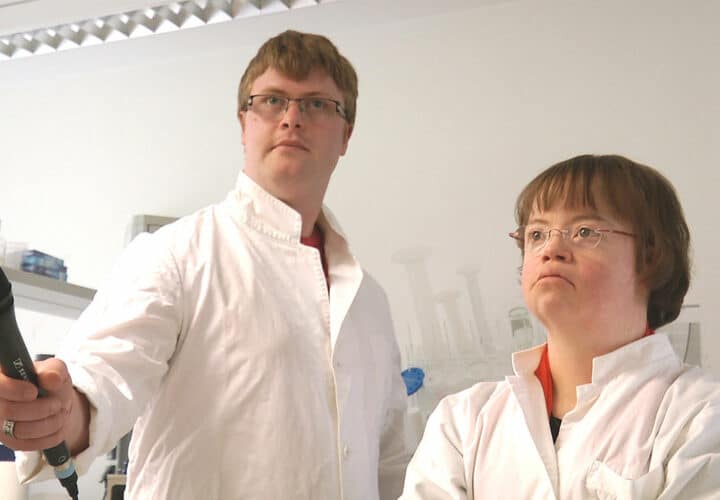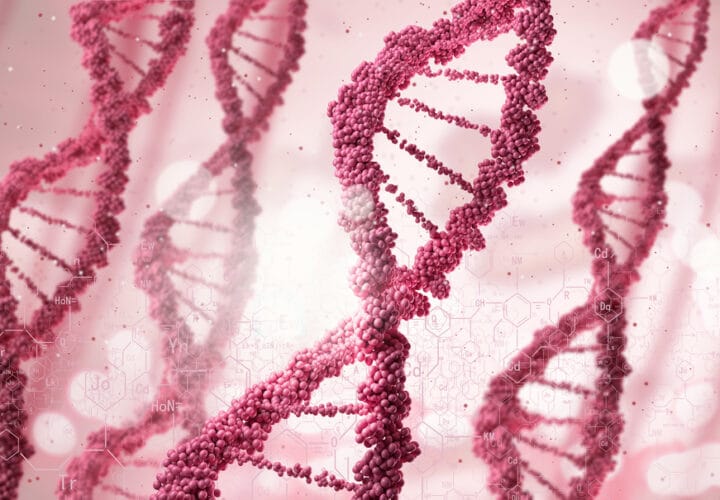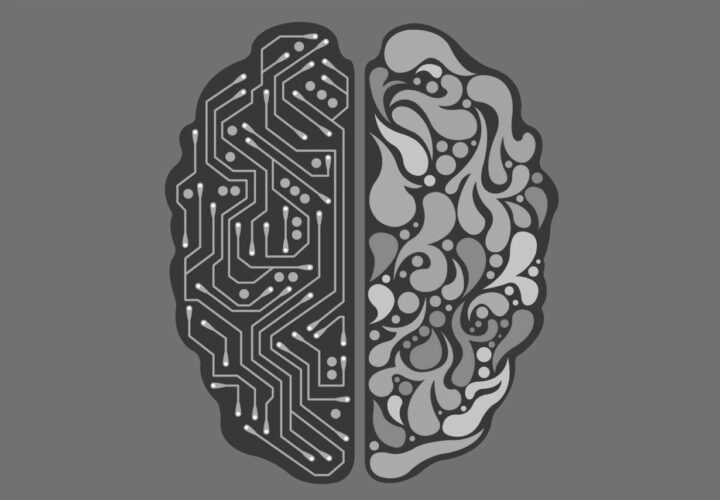People with Down syndrome are more likely to develop Alzheimer’s disease than the general population. Scientists believe that studying Down syndrome may offer vital clues to in the quest to develop effective treatments for Alzheimer’s.
Being Patient spoke with Dr. Brian Skotko, Emma Campbell Endowed Chair on Down Syndrome and medical geneticist at Massachusetts General Hospital, about the link between Down syndrome and Alzheimer’s, and the research that is now underway to target Alzheimer’s hallmark beta-amyloid plaques in people living with Down syndrome.
- People with Down syndrome have three copies of chromosome 21, and they have an extra copy of the gene known as APP which codes for the amyloid precursor protein
- Beta-amyloid plaques may begin accumulating in the brains of people with Down syndrome as early as their adolescence years
- By the age of 40, about 40 percent of people with Down syndrome will develop Alzheimer’s. At the age of 50, more than 50 percent will have the disease
- Early signs of Alzheimer’s for people with Down syndrome can include changes in behavior, personality and the onset of seizures
Being Patient: What’s the relationship between Alzheimer’s and Down syndrome?
Dr. Brian Skotko: People with Down syndrome are going to have those keys to unlock some of the mysteries for Alzheimer’s for the rest of us. It all goes down to the genes on the chromosomes. The typical person has 46 chromosomes, or 23 pairs of chromosomes. People with Down syndrome have an extra chromosome so they have 47 chromosomes. That’s because rather than having the typical two copies of chromosome 21, they have three copies of chromosome 21.
When we zero in on what are those genes on chromosome 21, we know that there is a gene called the APP gene, and that is a gene that encodes for amyloid plaques that could build up in the brain. Whereas a typically developing person has two copies of those genes, someone with Down syndrome has three copies. This is in part believed to be some of the contributions of why people with Down syndrome accumulate plaques sooner and more often than their neurotypical counterparts.
A lot of research is being invested to help improve the medical outcomes for people with Down syndrome, partnering with them so that they can help us understand more about Alzheimer’s disease.
Starting at the age of 40, about 40 percent of people with Down syndrome do develop dementia related to Alzheimer’s and around the age of 50, more than 50 percent of people with Down syndrome do develop dementia. One curious fact is the other 50 percent do not.
Being Patient: Tell us about your personal connection with Down syndrome and what motivated you to work in this field?
Dr. Brian Skotko: I have two great sisters. Kristin, who is two years younger than I am, does have Down syndrome and she’s been a life coach for everything that I do and it’s because of her that I wanted to become a physician. It’s also because of her that I continue to have the passion and motivation. And Kristen is healthy and she is well.
But I also know she’s worked so hard for all of her accomplishments, and I don’t want her to one day lose it to Alzheimer’s and I know so many people out there who have loved ones feel the same and we all want to be able to fight the impact of Alzheimer’s together.
Being Patient: What are some of the early signs of Alzheimer’s for people with Down syndrome?
Dr. Brian Skotko: The presentation of Alzheimer’s in people with Down syndrome shares many of the same characteristics as the presentation of early onset Alzheimer’s [in otherwise cognitively healthy people], with a few distinguishing characteristics: One is, oftentimes in people with Down syndrome, the first presenting signs are changes in behavior or changes in personality. Perhaps the person with Down syndrome all of a sudden gets upset when things don’t happen in a certain order, or perhaps they are more anxious or perhaps they are more afraid of things that they weren’t afraid about before.
Another early sign that seems to be somewhat specific to people with Down syndrome is early-onset seizures. Seizures in an adult with Down syndrome sometimes are an ominous precursor that there might be Alzheimer’s to come. But all the other same symptoms of memory loss and some of the loss of activities of daily functioning that we would see in the adult typical population with Alzheimer’s do come afterwards and people with Down syndrome.
But I also must say that there are so many other medical conditions that could occur in people with Down syndrome that might masquerade as Alzheimer’s, and it’s important to rule those out. It’s not uncommon for us in the clinic to see an adult with Down syndrome who is having some brain fogging, or some memory loss, and we realize it’s due to severe obstructive sleep apnea. And we know how to treat that. We could treat it with continuous positive airway pressure therapy or we could treat it with surgical techniques. Once they get good oxygenated sleep and we treat the sleep apnea, their brain fog and memory loss is gone.
As important as it is to make a diagnosis of Alzheimer’s disease, it’s equally important to make sure we’ve ruled out some of the other conditions that can masquerade as memory loss.
Being Patient: At what point in their lives do people with Down syndrome have plaques in their brains?
Dr. Brian Skotko: Research is still trying to untangle that, and the only way to truly know about plaques is unfortunately to do an autopsy after someone has passed. But increasingly with PET imaging and also, even with some retinal scans, we’ll be able to understand a little bit more about amyloid plaques. But some research is suggesting that as early as adolescent years, those plaques could start to accumulate in people with Down syndrome.
There have been some post-mortem autopsies done of adults with Down syndrome who have no clinical signs of dementia whatsoever. In autopsy, their brains are full of beta-amyloid plaques, so plaques alone are not the full answer to the mystery but it’s probably part of the mystery that’s leading to Alzheimer’s, at least in this population.
Being Patient: Would Alzheimer’s research of people with Down syndrome help propel the goal of finding an effective treatment for people with Alzheimer’s in the general population?
Dr. Brian Skotko: There are lots of clinical trials that are going on right now, both for the typical population with Alzheimer’s, and increasingly, for people with Down syndrome. For example, our site at Massachusetts General Hospital is participating in a phase one study to test a vaccine hoping to activate the body’s immune system to be able to attack those plaques and hopefully make those plaques start to disintegrate.
By working with people with Down syndrome and their families who might have an enriched possibility of developing Alzheimer’s disease and might have plaques more so than people in the typical population, we’re going to see what the effects are of such a vaccine on this population, which might have applicability to the general population.
The interview has been edited for length and clarity.
Contact Nicholas Chan at nicholas@beingpatient.com




I have twin daughters with Down Syndrome, they are 62 years old. One is unable to walk, has to be fed and bathed says about 4 words. The other is in the early stages of alzheimer’s. Both girls had IQ about 50.